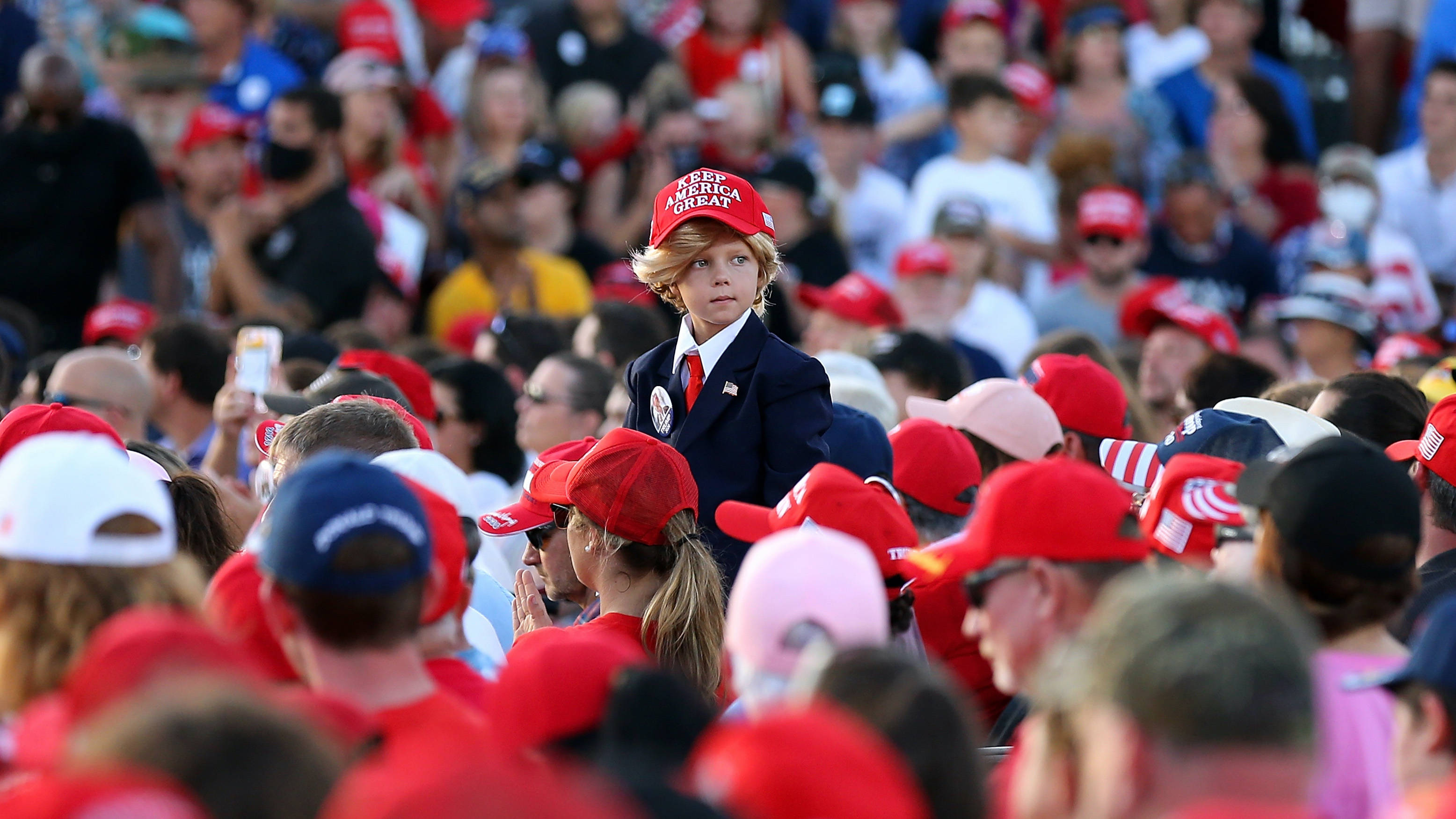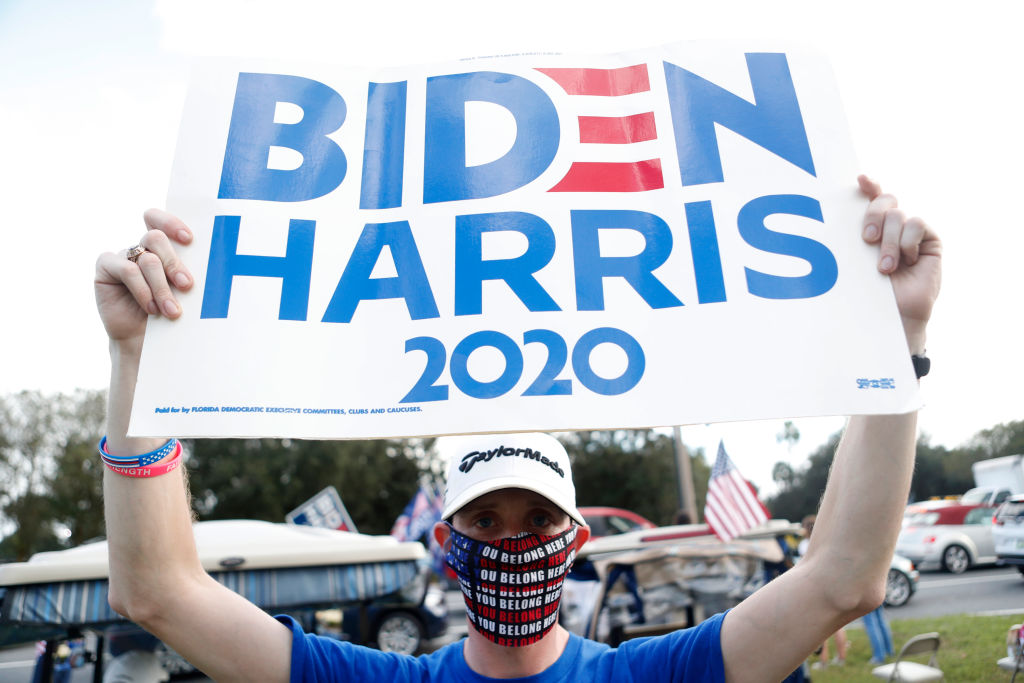
A young supporter looks on before a rally for President Donald Trump on October 23, 2020 in Pensacola, Florida. /Getty Images
A young supporter looks on before a rally for President Donald Trump on October 23, 2020 in Pensacola, Florida. /Getty Images
Editor's note: Djoomart Otorbaev is the former Prime Minister of the Kyrgyz Republic, a distinguished professor of the Belt and Road School of Beijing Normal University, and a member of Nizami Ganjavi International Center. The article reflects the author's views, and not necessarily those of CGTN.
On October 12 President Trump returned to the campaign trail in Sanford, Florida, less than two weeks after testing positive for coronavirus. It was his first of four planned campaigns stops with a full focus on battleground states. The same day Joe Biden spoke in Ohio, another swing state. In the time remaining before the national elections, they will both campaign exclusively on those states, largely ignoring all others. Why it is happening? How fair is it?
Few can dispute the fact that the most powerful country in the world and its only superpower, is the United States of America. Major events on a global scale, practically all solutions to key world problems, are associated with one or another aspect of domestic and/or foreign American policy, the positions that this country occupies. This is the reality of our world, acquired by the U.S. with the combined means of economic, military, technological, and cultural strength as well as with the various influence of its mighty soft power.
That is why the attention of the whole world is now riveted on the upcoming U.S. presidential elections, which will be held in ten days. The obvious fact is that in the context of globalization, the main political and economic decisions affecting the fate of all mankind, on the lives of almost every one of the 7.8 billion people around the world, will be made by approximately 150-160 million Americans. This is the number of U.S. citizens who, according to various estimates, will vote in the presidential elections on November 3. Which is two-to-three percent of the world's population. This is the harsh truth of today's incredibly interconnected world.
However, the peculiarity of the U.S. electoral system is that the number of voters who decide the fate of the world will be even much lower. It is all about the specificity of the country's electoral system based not on principles of the popular vote, but regulations of an electoral college vote.

Supporters of Democratic Presidential nominee Joe Biden rally during President Donald Trump's campaign stop at The Villages Polo Club, October 23, 2020 in The Villages, Florida. /Getty
Supporters of Democratic Presidential nominee Joe Biden rally during President Donald Trump's campaign stop at The Villages Polo Club, October 23, 2020 in The Villages, Florida. /Getty
This electoral system means that not all, but only a few states matter in elections, as the states enacted "winner-take-all" legislation. The legislation awards 100 percent of a state's electoral votes to the candidate receiving the most popular votes in each state. Thus, presidential candidates have no reason to campaign in or pay attention to voters in states where they are comfortably ahead or despairingly behind.
Winner-take-all was enacted by the states under their authority under Article II of the U.S. Constitution, which says, "Each State shall appoint, in such Manner as the Legislature thereof may direct, a Number of Electors...."
Since electoral-college votes are assigned by state and not by the whole country, and because smaller states have a disproportionately high number of votes, for the smaller states it became possible to overrule most voters.
It looks like that this year's election will be the most extreme. The event will have the narrowest electoral terrain ever. The "real" 2020 electoral map will be the smallest in years. According to various estimates, from six to 12 states are now classified as swing (or battleground) states. It means that the destiny of the world for the next at least four years will be decided by only about 30-40 million U.S. voters who live in those states. Which is less than half of a percent of the world's population.
Voting in the rest of the states, in which more than two-thirds of the country's population lives, will not affect national results. Since it is already well-known for which candidate the electors of these states will vote for in November. Among such states, for example, the largest ones, such as California and New York. How good is the current principle of electing the President of the most powerful world power? Is it fair that of the estimated 250 million American voters, just around 15 percent will decide the fate of the country and the world?
When the founders of the U.S. have established the principles of an electoral college, who are the group of state-appointed electors who officially choose the president, they were living in a vastly different world. The initial suggestion partly was a compromise over slavery norms. At that time, the southern states demanded that their slaves count as three-fifths of a person when allocating the votes, even though they could not cast ballots themselves. But it was also a product of ideas of the founders about elitism, "responsible democracy" and mistrust of the masses.
America has changed since 1787. Slavery was abolished 150 years ago. The electoral college has changed too. Originally the president was chosen by a small number of electors, i.e. responsible elites and aristocrats, specially selected and eligible to discuss the qualifications of presidential candidates. It now has been amended to allow states to assign their electoral votes to the winner of the popular vote. Each state has one voter in the 538-strong college for every member it sends to the House of Representatives and the Senate.
However, even after all reforms, the electoral-college system failed to reflect the choice of most voters. In two of the past five presidential elections, the winning candidate has lost the popular vote. As a most recent result, in 2016 Donald Trump lost the popular vote to Hillary Clinton by around three million people but had won 304 electoral votes, with 270 votes required, and the presidency. Previously it happened only three times – in 1824, 1876, and 1888. America should think again about what to do with their democracy in the 21st century.
(If you want to contribute and have specific expertise, please contact us at opinions@cgtn.com.)